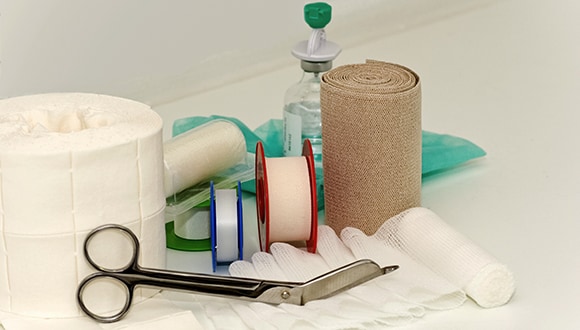Should I reuse, recycle or return my medication and medical supplies?
From crutches and X-rays to medicines, we look at what you can do with them after use or expiry.
Charmaine Yabsley
December 2018
The next time you’re rummaging through your first aid items, take note of what’s in there, and whether everything needs to be kept. Some medicines and other equipment can and should be disposed of safely, returned, or in some cases can even be recycled.

Return: medicines
A survey published in the Australian Health Review found that of the 4,302 respondents, 60% kept unwanted medicines in their house, even though around a third of these medicines had expired.
For people who had disposed of their out-of-date or unwanted medicines, around 66% had thrown the medicine away and around 25% had poured it down the sink. These medicines end up in waterways and landfill, which can cause environmental issues or even end up back in the food chain via water or fertilisers, reports the Pharmacy Guild of Australia.
According to one of the study’s authors Dr Fiona Kelly, a pharmacy lecturer at Griffith University, storage of expired and unwanted medicines in the home can be harmful – especially if you have small children. More than 5,000 children end up in hospital with medicine poisonings every year in Australia. According to the Australian Institute of Health and Welfare most of these kids are under 5 years old. So it’s important to store medicines safely and only have the medications you need at home.
In some cases, elderly people become confused with too many medicines in the home and this can lead to “medication mismanagement”, says Dr Kelly, which could include taking a dangerous out-of-date medication.
The solution? Follow this 3-step process from Return Unwanted Medicines.
READ: Gather all your medicines together. Read the labels, check expiry dates and review all medicines. Think about whether you actually need them.
REMOVE: Remove all expired and unwanted medicines from your home.
RETURN: Return expired and unwanted medicines to your local pharmacy.
Your pharmacist will put them in a secure bin for safe disposal. Prescription medicines, over-the-counter medicines, herbal or complementary supplements, gels, liquids, creams and veterinary medicines can all be disposed of this way. Medicines can be returned to any pharmacy for safe disposal – they don’t need to be taken back to the pharmacy you bought them from.
Reuse or donate: other medical supplies
If you’re considering getting rid of first aid or medical equipment you no longer need, such as crutches and bandages, donating them to international medical organisations may be an option.
Karin Eurell, co-founder of DocTours, says that they always need medical provisions and equipment for their volunteers to take overseas, including unused first-aid kit supplies.
“For a developing country, these bandages, masks and equipment may be the only supplies they have and are gratefully accepted.”
Another good resource for donating your unwanted medical supplies is MedEarth.
Mobility aids like crutches and wheelchairs can also be donated to Rotary’s Donations in Kind program.
Recycle: X-rays
X-ray films contain silver, which can be extracted and converted into pure silver, says the environmental foundation Planet Ark. The converted silver can then be reused for silver solder, jewellery, the silver plating of utensils, electrical components and film manufacture.
If you have small quantities of X-rays, you can post them to CMA Ecocycle Australia or Siltech PMR.
Related articles
MEDICINE CABINET ESSENTIALS
Are you equipped to handle the next nasty bout of the flu or grazed knee in your household? Make sure your supplies are up to the job — and not out of date.
HOW TO AVOID MEDICATION INTERACTIONS
Prescribed medication is an exact science so it’s important not to mix it with anything that affects how it works.
ADDICTIVE PRESCRIPTION DRUGS: UNDERSTAND THE RISKS
Get the facts on opiate and benzodiazepine misuse, and how to seek help.
THE FUTURE OF MEDICINE: THE FLU AND ANTIBIOTICS
Infection expert Dr Frank Bowden turns his microscope to the risk of a modern-day influenza pandemic and the fading effectiveness of antibiotics.